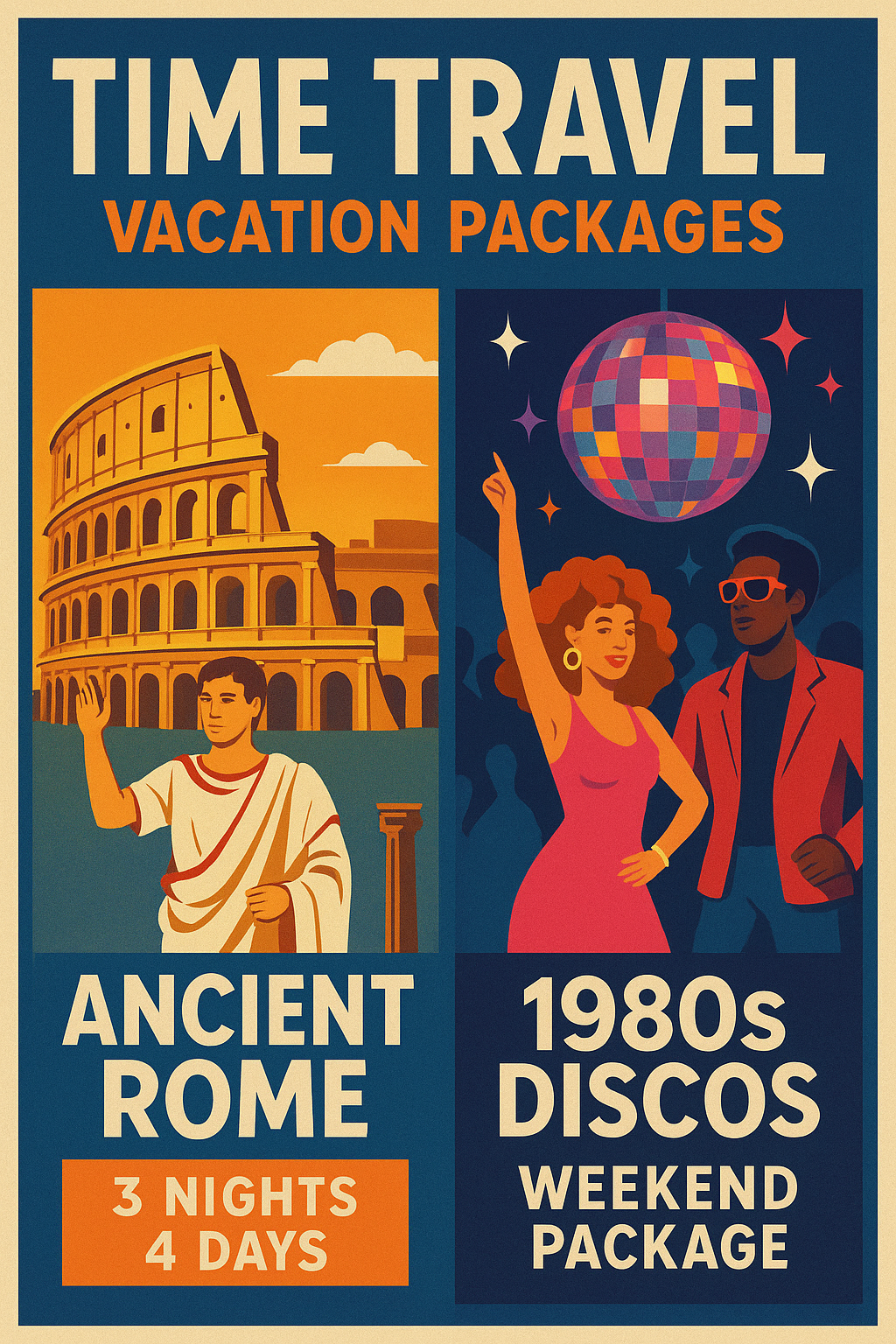What if Time Travel Had Tourist Packages? | Weekend Getaways Through History

Imagine scrolling through a travel booking site and finding options like:
- “3 nights, 4 days in Ancient Rome – Colosseum included.”
- “Weekend package: Woodstock 1969 – music, peace, and counterculture.”
- “VIP Experience: 1980s New York disco scene with Studio 54 access.”
If time travel ever becomes a reality, tourism may become its biggest commercial industry. Instead of flights and cruises, companies could offer temporal packages—curated experiences that let you live out iconic moments in history or revisit the best decades of fashion, music, and culture.
But what would such an industry look like? Let’s step inside the hypothetical travel agency of tomorrow, where the destinations aren’t continents, but centuries
The Business Model of Time Travel Tourism
Package Deals by Era
Just as today’s travel agencies offer “Paris in Spring” or “Safari in Kenya,” time travel agencies might market experiences such as:
- The Roman Holiday (27 BCE) – Gladiator games, a toga fitting, and dinner with senators.
- The Renaissance Tour (15th-century Florence) – Meet Leonardo da Vinci (before he becomes famous).
- The Swinging Sixties (London, 1967) – Psychedelic music festivals, miniskirts, and The Beatles’ rooftop gig.
- Back to the ’80s – Neon fashion, arcade halls, and early hip-hop block parties.
Travel companies would need historians, linguists, and even anthropologists on staff to make these journeys authentic while ensuring tourists don’t accidentally change history.
Insurance and Safety Protocols
One can imagine insurers coming up with wild new policies:
- “Paradox Coverage” – Protects you financially if your actions alter the timeline.
- “Existence Guarantee” – Ensures you return even if you accidentally prevent your great-great-grandparents from meeting.
- Health Add-ons – Vaccines for diseases long eradicated (think smallpox in the Middle Ages).
Luxury vs. Budget Time Travel
Much like air travel, there could be class divisions in temporal tourism:
- Luxury packages: Private guides, exclusive events (e.g., attending Cleopatra’s royal banquet).
- Budget packages: Group tours of the French Revolution with strict curfews to avoid guillotines.
The Ethical Dilemmas of Traveling Through Time
Time tourism wouldn’t be all fun and games. Several serious questions would arise:
- Exploitation of the Past
Would tourists treat historical figures as performers, similar to how some exploit local cultures today? Imagine Ancient Egyptians reduced to photo props for tourists in holographic Nike sneakers. - The Butterfly Effect
Every action has consequences. Dropping a single futuristic object in the past—like a wristwatch in Rome—could completely alter history. Tourism companies would likely enforce “look, don’t touch” rules. - Historical Inequality
Would only the wealthy be able to visit Shakespeare’s Globe Theater premiere in 1601, while budget travelers are stuck reliving the 1980s? The economics of time travel could mirror the same inequities we see in tourism today.
Tourist Favorites: Which Eras Would Sell Out First?
Based on current global interests, here’s a speculative list of top-selling time travel destinations:
- Ancient Rome (1st Century CE) – Gladiators, aqueducts, and Julius Caesar sightings.
- Medieval Europe – Castles, knights, and real Game of Thrones vibes (minus the dragons).
- Victorian London (1800s) – Gas lamps, foggy streets, and a chance to catch a glimpse of Dickens or Jack the Ripper.
- The Roaring ’20s (New York) – Jazz clubs, speakeasies, and flapper dresses.
- 1969 Moon Landing – The ultimate “front row seat” to history.
- 1980s Pop Culture – Michael Jackson concerts, VHS rentals, and the birth of MTV.
A survey by YouGov once found that many people would choose the 1960s and 1980s as their dream decades. This shows that nostalgia-driven tourism might dominate the industry.
The Risks of Time Travel Vacations
Even with all the fun, risks would be enormous:
- Health hazards – Poor sanitation in medieval Europe, volcanic eruptions in Pompeii, or airborne illnesses with no immunity.
- Language barriers – Ancient dialects could make communication impossible without futuristic translation devices.
- Political risks – Arriving in a period of war or revolution might be deadly unless carefully curated.
Tourism companies would likely market “safe history zones”—eras deemed low-risk for travelers, just as some countries today are flagged for or against travel.
Could Time Tourism Replace Traditional Travel?
Not entirely. The charm of visiting Paris, Tokyo, or New York in the present day wouldn’t disappear. Instead, time travel might become a supplementary tourism industry, catering to history buffs, thrill-seekers, and cultural explorers.
- Today’s travel influencers post selfies at Santorini sunsets.
- Tomorrow’s influencers might post: “Here I am at the signing of the U.S. Declaration of Independence, July 4, 1776!”
For some, experiencing the “real history” may feel more valuable than luxury resorts. But others might still prefer sipping cocktails on a beach in Bali—without worrying about paradoxes.
Pop Culture’s Fascination with Time Tourism
Time travel tourism isn’t entirely fictional. Pop culture has flirted with it for decades:
- Doctor Who (BBC) – The Doctor frequently takes companions on historical adventures.
- Back to the Future Part II – Biff Tannen literally becomes a “time travel tourist” in the worst possible way.
- Westworld (HBO) – While not time travel, the concept of immersive historical tourism is central to its narrative.
These fictional portrayals suggest that the human desire to “visit the past” is deeply ingrained in our imagination.
Future Outlook: Will Time Travel Packages Ever Exist?
While physicists like Stephen Hawking and Kip Thorne have debated the scientific feasibility of time travel, mainstream consensus is that practical time travel remains unlikely—at least for now (Scientific American).
However, advances in virtual reality (VR) and AI-driven simulations may give us a taste of temporal tourism. Already, museums use immersive VR experiences to recreate ancient sites, and platforms like ChronoZoom allow users to explore historical timelines interactively.
So while you might not book a literal package to Ancient Rome anytime soon, a digital version may become part of the tourism industry much sooner than we think.
A Future Where Vacations Mean Centuries, Not Cities
If time travel tourism were possible, it would revolutionize the way humanity experiences history. From “budget trips to the Middle Ages” to “luxury getaways in Ancient Egypt,” it would reshape not just tourism, but culture, ethics, and global economics.
For now, though, these weekend getaways remain hypothetical. But as VR and simulation technology grow, the line between imagination and reality may blur. One day, your travel agent may indeed ask:
“Would you like Paris in spring… or Paris in 1789?”




